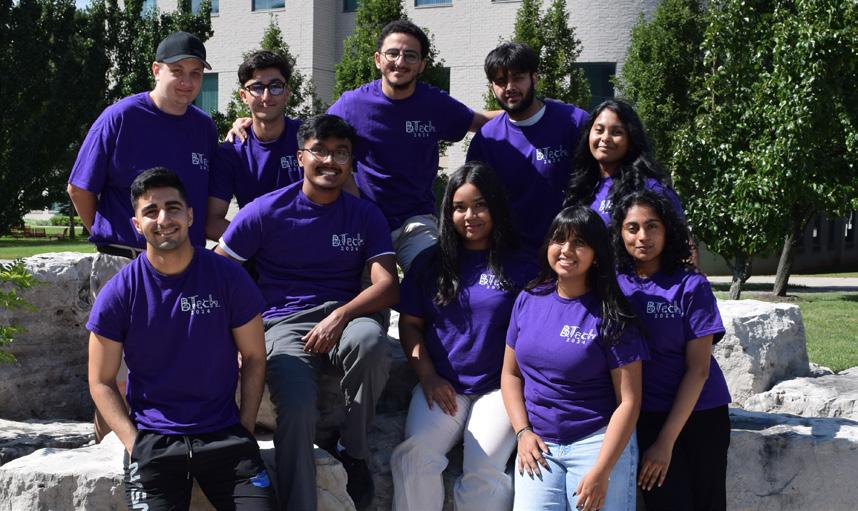












Annual Report 2024








The Walter G. Booth School of Engineering Practice and Technology (SEPT) continues to shine as a hub of innovation, collaboration and community impact within the Faculty of Engineering. At “W Booth,” as it’s fondly called, we embrace a philosophy that combines academic excellence with practical, real-world applications to meet the evolving needs of society, industry and our natural ecosystems.
In 2024, our interdisciplinary approach was on full display, as showcased by the remarkable stories in this report. From students developing groundbreaking technologies to tackle climate change and food insecurity, to faculty leading impactful research in sustainability and advanced manufacturing, the achievements of our community are both inspiring and transformational.
We’ve also celebrated significant advancements in applied research, with our faculty securing substantial funding for projects that address critical global challenges in clean energy, climate change adaptation and early disease detection. These efforts reflect our commitment to interdisciplinary solutions that leverage cutting-edge technology to create societal impact.
As we look ahead, W Booth School remains steadfast in its mission to deliver transformative learning experiences and foster a community that thrives on diversity, innovation and excellence. I invite you to explore the stories and successes captured in this year’s report — they are a testament to the incredible work being done on campus and beyond.
Sincerely,
Brian W. Baetz, P.Eng Director, W Booth School of Engineering Practice and Technology


For the second time in McMaster University’s history, and for the second year in a row, a student from the W Booth School of Engineering Practice and Technology has emerged as the valedictorian representing the Faculty of Engineering’s graduating class.
Master of Engineering in Systems Technology student Xiru (Jessica) Wang took to the Fall Convocation stage in November, delivering an inspiring address to the Faculty of Engineering’s graduating cohort.
“I felt a mix of surprise and excitement knowing how competitive the selection process is,” says Wang. “Yet, part of me also felt a quiet confidence, as I had put a lot of thought into expressing my genuine feelings and aspirations in my application. I hoped that sharing my journey in such a heartfelt way would resonate with the selection committee, and I’m grateful it did.”
Wang credits her success to three W Booth School faculty members: Zhen Gao, associate director (graduate programs), who provided valuable guidance on PhD studies and industry opportunities; Hoda Kamel, program chair, management courses, who provided mentorship during Wang’s role as vice-president of the SEPT Society; and undergraduate associate director, Kostas Apostolou, who has consistently encouraged her academic journey, supporting her master’s studies and now her pursuit of a PhD.
Driven by a strong desire to push technological boundaries, Wang plans to pursue a PhD. in neuroscience and AI or in biomedical engineering and AI.
After a series of delayed and missed flights, thirdyear Automotive and Vehicle Engineering Technology student Gopal Uppalapati, landed in Uganda on a mission: to empower farmers in the Bukedea region to harvest crops during the rainy season.
Traveling as a Canadian Fellow with Engineers Without Borders Canada (EWB)—a student-driven, non-profit organization devoted to international development, Uppalapati worked towards supporting the United Nations Sustainability Development Goals, with a focus on food insecurity.
“Due to climate change, farmers in the region face a harsh depletion in crop yield. A significant reduction in rainfall reduces their plowing capabilities from a four-week to two-week period, which strains local resources,” says Uppalapati. To supplement this loss, Uppalapati and his peers developed an apparatus connecting oxplowing technology to motorcycles.
after weeks of research and exploration, the group collaborated to create a practical solution. For more than three weeks, the group developed, prototyped and tested their farming tool with help from the locals.

Fueled by confidence and a sense of community
“We created business plans, pitch decks and presentations, which we presented in Kampala to Ugandan and Canadian investors at an Engineers Without Borders-hosted pitching event,” he says.
After nearly three months of hard work and dedication, Uppalapati and his team developed an efficient farming tool with practical application. By leveraging technology tailored to local conditions, Bukedea farmers can now cultivate their crops while minimizing financial and environmental impacts.

“This tool empowers farmers and fosters a resilient agricultural sector capable of adapting to climate change impacts,” says Uppalapati. “It took 14 Fellows, 13 weeks, four innovations and one massive Engineers Without Borders family.”

Is there a safer way to deliver essential supplies during a forest fire?
This is the challenge Master of Engineering Design students Jewel Fernandes and Parth Dode set out to address in their community-engaged project collaboration with the Canadian Emergency Responders Robotics Association (CERRA).
In recent years, forest fires have become increasingly severe, burning millions of hectares of land across Canada. These fires not only cause massive destruction to wildlife habitats and ecosystems but also pose a significant threat to human life and property.
To tackle the challenge, Fernandes and Dode employed a design-thinking approach, working closely with stakeholders to understand the unique needs of those on the front lines.
“Through iterative prototyping and rigorous testing, we explored a range of ideas and mechanisms,” says Fernandes. “Our focus was on creating a solution that not only meets technical requirements but also addresses the real-world constraints faced by emergency responders.”
The pair’s final prototype was a four-way hook mechanism. The four-way hook features four symmetrical attachment points, allowing it to connect to the payload container from any orientation. This design was inspired by the need for flexibility and reliability in real-world operations, where precise alignment can be challenging due to factors like wind, tilting, or swinging during drone flight.
To complement the four-way hook, the team developed a funnel shaped container to guide the hook into place. This container is equipped with magnets that work in tandem with the hook’s magnetic alignment system. As the drone approaches the payload, the magnets in the funnel container help to pull the hook into the correct position, ensuring a precise and secure connection.
“This prototype represents a significant step forward in the fight against forest fires. By enabling the safe and precise delivery of payloads, our design aims to reduce the burden on human responders, allowing them to focus on more critical tasks while ensuring that supplies reach those in need, even in the most inaccessible areas,” says Dode.

Driven by a passion for sustainability, fourth-year biotechnology student Maanvi Malik embarked on a transformative journey to Germany, where she conducted cutting-edge research at the Technical University of Kaiserslautern (RPTU). Renowned for its world-class research, RPTU provided the perfect backdrop for Malik’s mission to tackle challenges in bioprocessing.
Malik was awarded the highly competitive 2024 Deutsche Akademische Austauschdienst (DAAD) RISE Germany Scholarship. The RISE program (Research Internships in Science and Engineering) offers students from North America, the UK and Ireland the chance to work at leading German research institutions. Out of more than 2,300 applicants, Malik earned a spot as one of just 320 recipients.
Working in the Department of Reaction and Fluid Process Engineering, Malik’s research focused on optimizing foam management in a continuously stirred tank reactor (CSTR). Her project addressed inefficiencies caused by excessive foam formation, enabling more sustainable and efficient bioprocessing.
Influencing people to switch to electric vehicles through designing innovative, urban charging solutions is a strategy undertaken by a group of BTech Automotive Vehicle Engineering Technology students.
Earlier this year, the group participated in the International Design Engineering Education Association (IDEEA) Forum, an annual, international engineering and design challenge designed to inspire students in addressing global issues through innovative product design.
Between February and July, the team virtually joined more than 170 students from 22 universities across the world in different time zones, before meeting in Transylvania, Romania at the University of Brasov for a forum.
Ali Rajguru, Usama Jahan, and Carl Flores were teamed with students from Politecnico di Torino in Italy, Hongik University in South Korea and Instituto Politecnico National in Mexico. Mentoring their team was Maria Pia Cavatorta, Professor at Politecnico di Torino and W Booth School Professor, Dan Centea. The international committee who assessed the projects presented the team first place for Best Engineering and third place for Best Product Innovation.
Best Engineering 1stPlace Team 4

Product Innovation 3rd Place Team 4 2024 IDEEA Project Competition “Urban Charging Solutions” in cooperation with Volkswagen AG

“I am incredibly grateful for this invaluable learning opportunity,” says Malik. “I owe much of my success to Professor Fei Geng for his unwavering support throughout my undergraduate years.” 2024 IDEEA Project Competition “Urban Charging Solutions” in cooperation





Jim Cotton, holder of the Class of 1962 Mechanical Engineering Endowed Chair in Eco-Entrepreneurship, and Adjunct Professors Kate Whalen and Greg Zilberbrant were among 50 subject matter experts who spoke at PIVOT TECH ’24, a community-based sustainability conference devoted to accelerating the adoption of clean technologies and innovative practices in energy, buildings, and manufacturing.
The event, sponsored in part by McMaster University and held at the historic Cotton Factory in downtown Hamilton, drew more than 225 changemakers who are helping our region transition to a low-carbon future. It provided an opportunity to showcase W Booth School’s applied expertise in areas ranging from thermal networks and green infrastructure to smart systems and circular manufacturing. The day-long program aligned with our school’s focus on sustainable development and commitment to communityengaged teaching, learning and research.
The Battery Workforce Challenge, sponsored by Argonne National Laboratory, the Department of Energy (DOE) and the Stellantis Group, aims to bridge critical skill gaps in the rapidly evolving battery industry. Awarded to 12 universities across North America for a period of three years, this initiative focuses on cultivating a new generation of experts in battery technology through funding and resources for advanced research and hands-on training.
Participants gain invaluable experience through collaborative projects and direct engagement with
industry leaders, preparing them to innovate and advance energy storage solutions.
McMaster University’s team, guided by advisors consisting of faculty from the Faculty of Engineering, achieved notable success in the first year of the competition, securing fourth place overall, first in cell characterization and first for the Expo Award. Moein Mehrtash, associate professor and program chair for the Automation and Vehicle Technology program serves as a faculty advisor for the McMaster Battery Workforce Challenge team.

The EcoCAR EV Challenge brings together 15 North American universities to design a next-generation battery electric vehicle (BEV) featuring automation and vehicle-to-everything (V2X) connectivity. The goal is to develop energy-efficient, customer-focused technologies that support the automotive industry’s decarbonization efforts. McMaster University and the University of Waterloo are the only Canadian teams in this prestigious competition.
McMaster’s EcoCAR team includes more than 100 students, with significant contributions from BTech Automotive and Automation program students and alumni, many of whom are now pursuing MASc and PhD degrees at McMaster Engineering. Faculty advisors for the team include professors Ali Emadi, Mark Lawford and Dan Centea, with professors Dan Centea and Hoda Kamel mentoring students for competition presentations.
Following General Motors’ engineering design process, the competition involves rigorous technical
deliverables and culminates in annual evaluations. In May 2023, McMaster’s EcoCAR team achieved an impressive third place overall in the Year 2 competition, earning numerous accolades, including:
• 1st Place in Equity in Mobility Presentation
• 1st Place in Equity in Mobility Program (sponsored by the U.S. Department of Energy)
• 1st Place in Communications Plan
• 1st Place in Communications Program
• Best Social Media Management
• 1st Place in Execution Plan
• 2nd Place in Project Management Program
• dSPACE Choice Award for CAV Innovation
Several team members from the Automotive and Automation programs are now advancing their education at the graduate level, contributing to McMaster’s legacy of innovation and excellence.

Gail Krantzberg, professor and former program lead for the Master of Engineering and Public Policy program, is leading efforts through the Climate Change Adaptation and Resilience Strategy (CLARS) project. Krantzberg is creating co-produced adaptation strategies to reduce socioeconomic vulnerabilities and build resilience for climate migrants and host communities across the Lake Victoria Basin and Great Lakes Region.
Coordinating research and outreach across multiple countries and

institutions, Krantzberg’s team generates locally produced data to inform policies that enhance socioeconomic conditions for both migrants and host citizens. With more than 35 years of experience in Remedial Action Plans for the Great Lakes, Krantzberg also advises the Department of Fisheries and Oceans on Marine Spatial Planning (MSP), leveraging her expertise in governance, collaborative forums and stakeholder engagement, including working with Indigenous populations, to inform MSP practices on a national and regional scale.


Experiential teaching, learning and research delivered through community-engaged projects is a big part of W Booth School’s identity. It’s how we prepare students for career success in a changing world, help faculty interact with external parties and contribute to the growth and prosperity of our region.
In 2024, we completed a wide range of communityengaged projects focused on select theme areas including healthcare and quality of life, livable cities and smart systems.

These projects, facilitated by Community Engagement Coordinators Richard Allen and Salman Bawa, are developed and delivered in close collaboration with a growing network of community partners. They enable students and faculty to apply competencies in state-of-the-art technologies such as AI/ML, virtual reality, digital twinning, IoT, bioengineering, automation, and robotics. Together, they address complex challenges, yielding mutual benefits.
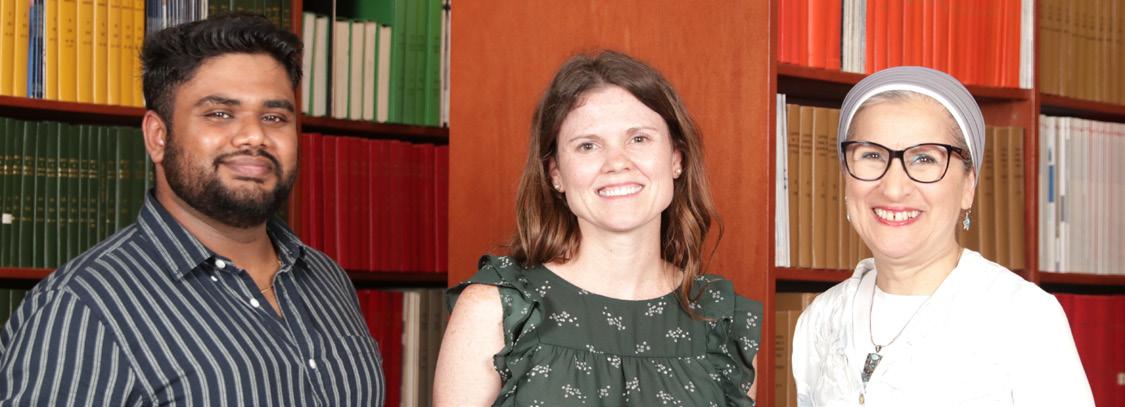


Here’s a snapshot of key accomplishments in 2024:
36 communityengaged projects
77 participating graduate students
20 participating community partner organizations
20 participating faculty members
Looking ahead, W Booth School is keen to grow engagement with more remote communities across Canada.
Remote communities in Canada continue to grapple with the effects of colonization. The Faculty of Engineering through W Booth School’s Opportunity Marketplace is paving the way for collaborative solutions to address these pressing issues.
Launched by Community Engagement Coordinators Salman Bawa and Richard Allen in 2023, Opportunity Marketplace facilitates the exchange of teaching, learning and research opportunities among university faculty and representatives from the public, private and not-for- profit sectors.
This year’s event brought together approximately 50 McMaster staff and faculty, and external partners to discuss pressing issues and potential solutions around the theme: Meeting the needs of Canada’s remote communities.
“Reconciliation is not just a word; it’s a commitment to understanding and to action,” said Hill.
“When we engage with remote communities, we must do so with respect and a deep appreciation of their histories, cultures and the unique challenges they face. Only then can we truly collaborate and create meaningful change.”

Throughout the event, participants heard from various speakers including Barry Hill - Indigenous leader, McMaster Engineering alumnus and the Faculty’s Engineer-in-Residence.
Other guest presenters spoke on topics which include wildfires, water preservation, healthcare, renewable energy, food sovereignty and access to the digital economy. This was followed by round table discussions to explore potential solutions.
The need for interdisciplinary collaboration is crucial to address contemporary challenges like climate change, poverty and their cascading effects on issues such as wildfires, healthcare and housing. Opportunity Marketplace aims to foster connections with remote communities and transform discussed opportunities into actionable projects that leverage W Booth School’s strengths in practice-based education.



The Enhancing Patient Autonomy in Home Oxygen Therapy project led by Robert Fleisig, brought together Master of Engineering Design students Mohit Johar and Yaowen Wu, along with healthcare professionals from St. Joseph’s Healthcare Hamilton.
The students developed an innovative, user-friendly watch interface that monitors blood oxygen levels, heart rate, oxygen tank status, physical activity, symptoms and medications, while also enabling emergency contact functionality.
Critical contributions from healthcare partners Daniel F. Vermunt and Anna D’Angela, Physician Assistants at the Firestone Institute for Respiratory Health, were invaluable.
Additionally, ProResp Inc. ensured the solution was aligned with the practical aspects of oxygen therapy delivery. This collaboration resulted in a meaningful tool that empowers patients with real-time health data, improving care and interventions.
Maged Eid, a Master of Engineering in Systems and Technology student represented W Booth School in the prestigious Innovation Think Tank (ITT) Competition. Organized by Hamilton Health Sciences Research, St. Joseph’s Healthcare Hamilton and Siemens Healthineers Canada, in collaboration with McMaster University, the competition focuses on fostering innovative solutions for a greener, more sustainable healthcare system.
Eid, currently completing his final term, is also a Research Assistant in McMaster’s Faculty of Medicine. His research involves segmenting and quantifying components from Hematoxylin and Eosin (H&E-) stained pancreatic tumor images, work that has already yielded strong results and is progressing toward a journal publication.
During the competition, teams tackled complex challenges by proposing three solutions. Eid’s team presented ideas leveraging AI and Computer Vision to enhance medical imaging accuracy, personalized care instructions to improve patient compliance and automated documentation technology to boost clinical efficiency.

Under the visionary leadership of Tom Wanyama, the Learning Factory is revolutionizing education in Industry 4.0 and smart manufacturing. Wanyama, its director, is driving the Factory’s transformation to an innovation hub that bridges academic learning with real-world application.
Wanyama has prioritized equipping students with hands-on experience in supply chain integration, energy management, predictive maintenance and industrial systems optimization. In courses such as Manufacturing Systems, students use cutting-edge tools — including CNC machines and IoT-enabled systems — to design and produce walking canes to market for retail and donate to the community.
East Africa, a non-governmental organization, led by Wanyama and dedicated to improving maternal and child health outcomes in the region.

Irina Barsan was the first person to receive a donated cane following knee replacement surgery, and the team recently donated a walking cane to Salvatore Marchese, age 92, enabling him to maintain his independence.
Similarly, Wanyama has introduced projects like SEP 742 Visual Perception for Autonomous Vehicles, which will incorporate remote-controlled cars as platforms for self-driving vehicle experiments.
Beyond academics, Wanyama is leading efforts to foster innovation through projects like MES_Core, an affordable Manufacturing Execution System for smalland medium-sized enterprises. This groundbreaking system, developed under Wanyama’s guidance, is being prepared for commercialization through TechBasics Inc.
Wanyama’s leadership extends to community and global initiatives. Through the Learning Factories Worldwide program, which Wanyama started, he has partnered with universities in developing countries to build manufacturing capacity. He is also spearheading the design of sustainable water filtration systems to support maternal health initiatives in Uganda.
This collaborative initiative involves a partnership with Uganda Christian University and Save the Mothers –
The project centres on the design and production of a sustainable water filtration system. Access to clean water is critical for maternal health, as contaminated water sources can lead to preventable diseases and complications during pregnancy. The water filter being developed will ensure safe drinking water for healthcare facilities, maternity wards and surrounding communities. It incorporates advanced filtration technology designed for affordability, scalability, and ease of use in resourcelimited settings.
Once the prototype is complete, the Learning Factory will transfer the technology to Uganda. This will include setting up a local learning factory where water filters can be manufactured using locally available materials and labor. The initiative not only addresses an immediate health need but also builds local capacity by training individuals in manufacturing and systems integration.
This initiative is part of a larger global collaboration, with Wanyama playing a key role in linking educational innovation with community-focused problem-solving.

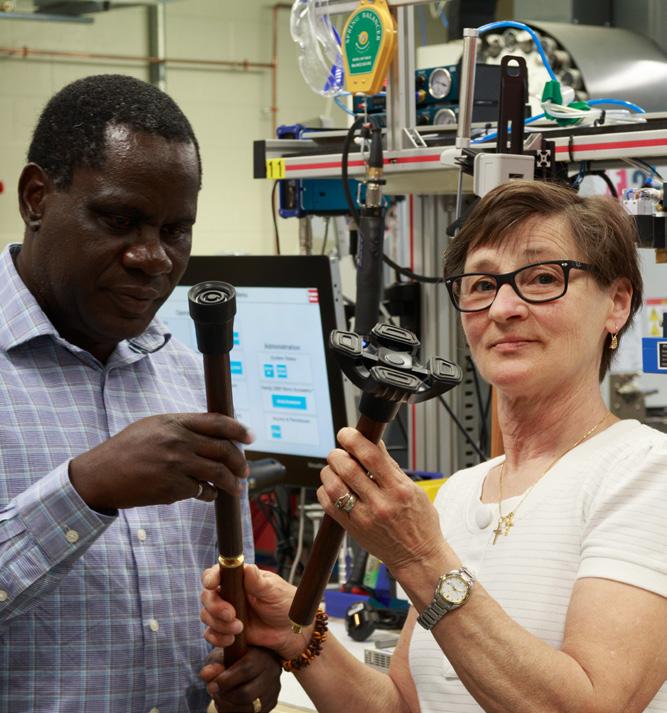

Fei Geng receives $50,000 grant for 2024 Lung Ambition Award
Fei Geng, Chair of the Bachelor of Technology – Biotechnology program and Lead of the Master of Engineering in Manufacturing Engineering – Biomanufacturing program at W Booth School received the 2024 Lung Ambition Award. Presented by Lung Cancer Canada and the Lung Ambition Alliance, the award recognizes Geng’s groundbreaking work on a blood-based test for early lung cancer detection.
“This incredible honour highlights our commitment to accessible, accurate early detection methods,” says Geng. Supported by a $50,000 grant, his team aims to enhance test sensitivity and explore applications for other cancers, advancing global cancer care through interdisciplinary collaboration.

Hamidreza Mahyar and team receive $14,000,000 to enhance Intelligent Electric Vehicle Drive Systems
In collaboration with faculty members across various departments, professor Hamidreza Mahyar received $14,000,000 in funding. ($5M from Stellantis; $5M NSERC Alliance; and $4M Mitacs Accelerate) The project goal: to enhance Intelligent Electric Vehicle Drive Systems with the help of hardware and software technology, in particular Artificial Intelligence and Machine Learning. The project will last four more years.

Gail Krantzberg receives $1.5M grant to investigate effects of urban migration due to climate change
Professor and climate change expert, Gail Krantzberg, and her colleagues on the Climate Adaptation and Resilience Strategies (CLARS) team received $1.5 million in funding from the New Frontiers in Research Fund through the 2023 International Joint Initiative for Research in Climate Change Adaptation and Mitigation competition to investigate effects of urban migration due to climate change.
Key components of the project include evaluating policy responses to climate change, predicting urban migration patterns, developing inclusive adaptation strategies, protecting ecosystem quality and promoting knowledge exchange. “The goal is to create policies and practices that improve the well-being of both migrants and host communities in the face of climate challenges,” says Krantzberg.

The BioX research group, led by Assistant Professor Seshasai Srinivasan and Associate Professor Amin Reza Rajabzadeh, focuses on developing cutting-edge nanomaterials and technologies for biosensing, environmental monitoring and public health.
Their team, which includes postdocs, graduate students and an undergraduate co-op student, is working on projects such as creating nanomaterials to detect neurotransmitters, drugs, antibiotics and pollutants. They are also exploring carbon dot-based materials for drug delivery, tactile sensors and antibacterial coatings for hospitals. Currently the team is developing a biosensor for the early detection of endometriosis, a chronic medical condition in which tissue like the lining of the uterus, grows outside the uterus. Endometriosis, which is often diagnosed at a later stage can significantly affect quality of life including physical, emotional and reproductive health.
The group enhances their innovations with AI tools and has published more than 50 papers in top journals, earned patents and received funding from key agencies and industry. Their work has garnered prestigious awards, including the H.G. Thode Fellowship, Ontario Graduate Scholarship and recognition for student research excellence.


Allan MacKenzie made notable strides in virtual hybrid education research in 2024. Mackenzie has published two journal papers on projectbased learning and strategic management education and presented findings at national and international conferences. His work on using reflection questions to enhance metacognition in engineering education has received recognition, strengthening our school’s academic reputation. Mackenzie also contributed as an editorial board member and reviewer for leading journals, ensuring scholarly rigour in publications and reinforcing W Booth School’s commitment to academic excellence.
With a background in circular economy and carbon mitigation, coupled with his industry experience in technical and leadership roles across numerous industries, Greg Zilberbrant is involved in the delivery of undergraduate and graduate courses at W Booth School.
Zilberbrant is also the founder of Beyond21 Academy, a non-profit organization tackling the gap in knowledge and action on climate change. His organization has received support from government and private organizations to create experiential, impact-focused climate action opportunities through engagement and training. He drives impactful change by working with W Booth School, along with other educational institutions across Canada and organizations like the UN Economic Commission for Europe, the Institute for Sustainable Infrastructure and the Sustainable Technology Evaluation Program.
Outside of teaching, Zilberbrant has supervised over a dozen graduate student researchers and has hired five W Booth School graduates.



When W Booth School of Engineering Practice and Technology set out to raise $3,000 for cancer patient care at the Grand River Regional Cancer Centre (GRRCC), no one could have predicted the overwhelming response. What started as a modest goal turned into a powerful movement fueled by compassion and community.
Since 2019, Michele Vaz, W Booth School’s Business Manager has led a fundraising effort for a meaningful cause.
This year’s campaign was inspired by Tom Lee, a cherished member of our community. The former graduate, associate director and program lead for the Master of Engineering Entrepreneurship and Innovation program was diagnosed with Stage 3 colon cancer in April 2022, Lee’s journey has been one of resilience and strength. By late 2023, his diagnosis progressed to stage 4 metastatic colon cancer, and he now receives palliative chemotherapy at GRRCC, where he has expressed heartfelt gratitude for the exceptional care provided.
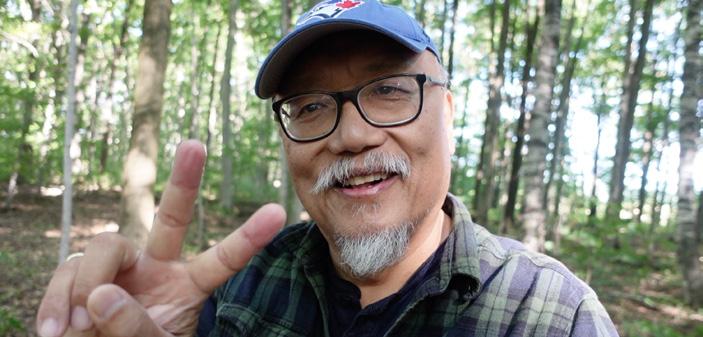
Fueled by Lee’s story and the collective generosity of a united community, the campaign shattered its original goal. Through strategic outreach and heartfelt storytelling, the W Booth School raised an incredible $10,102 in just three weeks — more than tripling its initial target.
With these funds, GRRCC will purchase a chemotherapy chair in honour of Lee and W Booth School. The remaining contributions will support the centre’s highest-priority needs, ensuring that patients like Lee continue to receive the exceptional care they deserve.
W Booth School extends its deepest gratitude to every donor, advocate and supporter who made this campaign such a resounding success. Together, we’ve proven that even the smallest acts of generosity, when multiplied by many, can achieve something extraordinary.




W Booth School partners with St. George’s University School of Medicine to offer pathway for Biotechnology graduates to train as medical doctors
A groundbreaking new pathway for W Booth School biotechnology graduates to pursue medical careers. Starting in 2025, graduates will have the opportunity to train as medical doctors at St. George’s University School of Medicine (SGU-SOM) in Grenada, through an articulation agreement led by Allan MacKenzie and supported by Kostas Apostolou.
This initiative builds on Mackenzie’s 2019 Emerging Leaders in the Americas Program involvement, which led to collaborations with SGU.
“St. George’s University is delighted to offer this new opportunity for aspiring doctors from W Booth School to pursue degrees in medicine with us,” said Dr. Marios Loukas, Dean of St. George’s University School of Medicine. “SGU is tremendously proud to partner with W Booth to create more avenues for qualified Canadian students to become practicing physicians, while helping to address Canada’s ongoing physician shortage.”
Key benefits include waived application fees, an $85,000 USD scholarship and no MCAT requirement due to the robust biotechnology curriculum. Students will begin studies at SGU’s Grenada campus and complete clinical rotations in the U.S., Canada or the UK. This partnership reflects W Booth School’s commitment to global collaboration and medical education excellence.




The reimagined Master of Engineering Entrepreneurship and Innovation (MEEI) and Master of Technology Entrepreneurship and Innovation (MTEI) programs are now course-based, focusing on corporate innovation and strategy. Designed for early- and mid-career professionals, executives and entrepreneurs, the revamped curriculum aims to train graduates as innovation leaders who are ready to bring transformative ideas to the market.
Led by Seshasai Srinivasan, holder of the Endowed Chair, W Booth Chair in Engineering Entrepreneurship and Innovation, and program chair of BTech Software Engineering Technology, the programs emphasize forward-looking digital pedagogy, fostering a sense of belonging and deep-rooted engagement with W Booth School’s community partners.

A
Starting in Fall 2025, graduates of Bachelor of Technology (BTech) programs in Automation Systems Engineering Technology, Automotive and Vehicle Engineering Technology and Biotechnology, who started in 2019 and onward, will be eligible to apply for an Accelerated MBA with McMaster’s DeGroote School of Business. This accelerated pathway offers a streamlined route to an MBA in as little as eight months of full-time study or on a longer schedule for part-time study.

This new pathway recognizes the strength of BTech’s business and management curriculum and builds upon W Booth School’s recent Accreditation Council for Business Schools and Programs (ACBSP) accreditation as an Undergraduate Business Program. This opportunity can be largely attributed to the efforts of Michael Justason, chair of the Bachelor of Technology Business and Management curriculum for four-year programs and program chair for Civil Engineering Infrastructure Technology.
“Combining a BTech degree with a DeGroote MBA opens amazing opportunities for our graduates to become the future leaders of business and technology.” – Michael Justason

Silvie Tanu Halim successfully defended her PhD this year. Tanu Halim developed a generic numerical technique for calculating individual phase material behavior in dual-phase steel. This method minimizes the reliance on costly and complex experimental measurements typically needed to calculate individual phase stress flow curves. She proudly walked the Convocation stage in November. Tanu-Halim was supervised by Eu-Gene Ng, a celebrated educator and researcher in the W Booth School, known widely for his dedicated and passionate mentoring of junior colleagues.
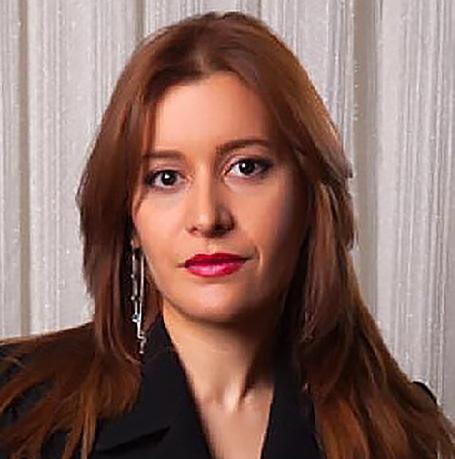
The Institute of Electrical and Electronics Engineers (IEEE) published a short biography on the life of Marjan Alavi in December 2023. The biography, titled, Paying it Forward, a Journey with Many Chapters positions Alavi’s story as one of resilience, strength and encouragement. Hard copies were published in February of this year.
In March the McMaster Student Union (MSU) hosted its annual Teaching Awards ceremony. These awards were created to acknowledge and promote excellence in teaching by presenting awards on behalf of all MSU members. W Booth School was well represented at the ceremony with three of our faculty members receiving awards presented by Dean Heather Sheardown.


This award is presented to an instructor who has shown dedication to teaching innovation at McMaster University.
As an instructor during a global pandemic, the pressures of adapting to new ways of teaching were immense. Abu-Ghazalah rose to the challenge and found innovative technologies to help ensure that his students were getting the highest quality of lectures and course material.
From creating complementary course content in the form of videos to address knowledge gaps to incorporating lightboards (an invention by Mike Justason to enhance livesynchronous virtual learning experiences) in online teaching, making his lectures more accessible, Abu-Ghazalah has shown time and again his dedication to his undergraduate and graduate students’ learning by using different innovative techniques and technologies to create a more equitable learning environment, particularly for students with hearing challenges.

Alavi has successfully integrated her academic expertise in AI and Smart Systems into community projects, making a tangible and lasting impact. Her collaborative initiatives have resulted in longlasting collaborations with our community partners in diverse areas such as Healthcare, Digital Manufacturing, Smart Cities, Autonomous Vehicles and Transportation. She has led over 20 successful communityengaged projects over the past three years.

Her passion for making a difference, coupled with her exemplary leadership and collaborative spirit, make her a highly deserving recipient for this honour.

This award celebrates instructors whose contributions embody McMaster’s Principles of Community Engagement locally, nationally and globally. Wanyama’s impact spans continents, shaping communities through his teaching and research. On campus, he mentors undergraduate students by involving them in real-life, discipline-based projects, fostering critical thinking, problem-solving and hands-on experience through co-op, workstudy and capstone courses. His research with Laurentis Energy Partners advances nuclear waste automation to enhance Canada’s manufacturing competitiveness. Internationally, his collaboration with Save The Mothers – East Africa leverages AI, big data and cloud computing to improve maternal health through better water sanitation and hygiene. Wanyama’s leadership exemplifies engineering’s global impact.

The North American Auto Industry since NAFTA authored by Master of Engineering and Public Policy Program Lead Greig Mordue and published by University of Toronto Press, examines the issues that have preoccupied the development of policy associated with the manufacturing of automobiles in North America. The collection addresses the punctuations that have afflicted the industry since NAFTA’s implementation as well as the slower, incremental evolutions that have also occurred. Several aspects of automobility and the industry are explored, including but not limited to the Canadian, American and Mexican automotive sectors and their evolution and interaction under evolving trade regimes.
The book analyzes issues surrounding labour, technology, trade policy, regional development, the environment and broader societal impacts of the automobile. It also draws on the expertise of a wide cross-section of industry experts and scholars to provide readers with a deeper understanding of the automotive industry and its central role in North America’s economic, business and political landscape.

Election to the Academy is considered one of the highest honours for individuals in the Canadian health sciences community. CAHS fellows are chosen by their peers for their demonstrated commitment to their field throughout their careers and lives.
Heather Sheardown is a professor in the Department of Chemical Engineering, Dean of the Faculty of Engineering and an associate member of W Booth School. She holds a Tier 1 Canada Research Chair in Ophthalmic Biomaterials and Drug Delivery. Sheardown is the Chief Scientific Officer of 20/20 OptimEyes Technologies, a McMaster-based spin-off. Her lab is developing improved treatments for patients suffering from vision loss and other ocular conditions using micelle nanoparticles technology developed in her lab.




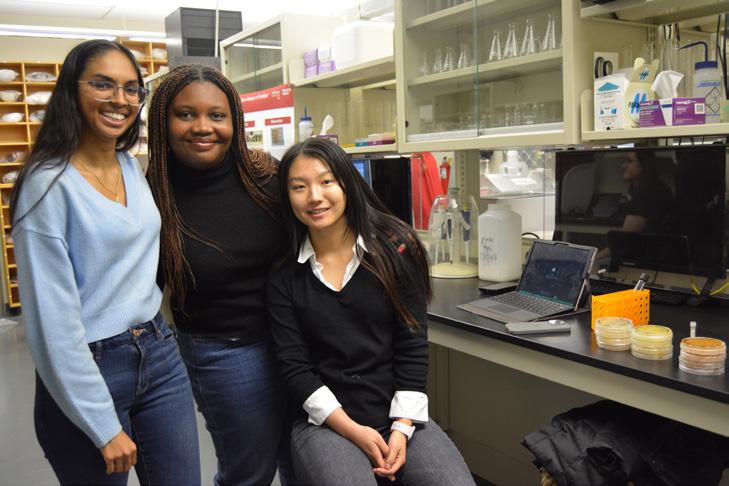
The BTech Association (BTA), composed of students from our Bachelor of Technology program, continued to enrich the student experience through a variety of impactful social, mentorship, academic, and professional development initiatives.
• Professional development: Hosted four events, including two Bio x iBio industry nights, the Mech n Auto industry night, and the Interview Blueprint event in collaboration with the SEPT Society.
• Academic support: Organized nine academic help nights to assist students in their studies.
• Community impact: Raised $500 during National Engineering Month in March, donating the proceeds to a local FIRST Robotics team.
• Mentorship opportunities: Held two mentorship events, including Alumni Night, which featured 30 alumni and attracted over 150 students.
• Community building: Organized a car show that brought together over 40 cars and 50+ students at the MARC parking lot.
• Welcome week: Held exclusive BTech events throughout the week and distributed 1000 + pieces of swag to incoming students
• Creative initiatives: Developed Faculty Trading Cards to strengthen connections among students and faculty.
• Collaborative efforts: Partnered with the SEPT Society, MEMS Society, Mechanical Engineering Society, iBioMed Society, and others on joint events.
• Leadership growth: Expanded the council with three new positions to better serve the student body.
On December 5, the BTech Capstone Showcase brought together creativity, innovation, and technical expertise as final-year students unveiled their impressive projects. From an automated shopping cart to machine learning applications in cell culture media validation, a renewable energy station, and a cherry tomato sorter capable of distinguishing between ripe, unripe, and defective produce, the evening showcased the remarkable ingenuity our students apply to real-world challenges.
On December 4, we celebrated an incredible milestone at the BTech Graduation Ceremony, honouring our BTech 4-Year and Degree Completion Program (DCP) students as they marked the culmination of their studies. The event was a testament to the hard work, dedication and perseverance of our graduates.
Michael Radocchia, a graduate of the Automation Systems Engineering Technology program, delivered a moving address that reflected on the journey of the BTech (4-Year) community:
“In BTech, there is a camaraderie and friendly atmosphere that is unmatched. Members of this community are approachable, caring, proud, and protective of their own.”
He also shared a poignant reminder he had learned from W Booth School Sessional Instructor Yotka Rickard:
“We should see ourselves not as students and professors, but as colleagues working together to accomplish a common goal.”
Shirley Marshall, a DCP Software Engineering Technology graduate, inspired by the valedictory address of Kian Yousefi Kousha who graduated this year with a Master of Science in Neuroscience, shared this reflection;
“We are more alike than different. Whatever struggles brought you to this point—financial difficulties, mental health battles, immigration challenges, grief, pain, procrastination—we are here. We made it together, and that makes us more alike than different.”


Hamidreza Mahyar has developed an innovative generative AI-powered Virtual Teaching Assistant to revolutionize the teaching and learning experience. Designed to support students in understanding complex concepts, this advanced tool fosters personalized, real-time interaction to address individual learning needs effectively.
By integrating AI technology into his courses, Mahyar has significantly enhanced student engagement and academic outcomes. The Virtual Teaching Assistant offers tailored explanations, automates administrative tasks and provides instant feedback, empowering students to learn at their own pace. This initiative also allows instructors to focus more on strategic teaching and mentoring, improving overall course delivery.
Mahyar’s groundbreaking project showcases the potential of AI to bridge gaps in education and inspire innovation, aligning with W Booth School’s mission to drive technological advancement in academic practice.


Navigating course selection and academic planning just got smarter thanks to AcademicGPT, an innovative AI-powered chatbot developed by Bachelor of Technology students Mitchell Culligan and Kuwar Dalal. Guided by Seshasai Srinivasan and Jeff Fortuna, this cutting-edge tool offers McMaster students tailored advice on courses, prerequisites and career pathways—all while operating offline to ensure data privacy.
“AcademicGPT’s ability to function offline is a gamechanger,” says Culligan, highlighting the team’s focus on security and accessibility.

The chatbot incorporates ethical AI practices and robust accuracy checks, earning praise from faculty. “Mitch and Kuwar applied their software engineering expertise to create an outstanding product,” notes Srinivasan.
Already attracting interest from the private sector, AcademicGPT is poised to redefine academic advising and inspire future student innovation at McMaster. This project exemplifies how technology and creativity can transform education.
W Booth School is collaborating with LABonWEB on a Mitacs-funded initiative aimed at enhancing the capabilities of an AI chatbot for advanced simulation. This innovative project, led by Master of Engineering in Systems and Technology program lead Marjan Alavi with McMaster University researcher Dhruv Patel, seeks to optimize AI integration to deliver an engaging and seamless learning experience for users.
By improving user interaction and providing more effective support for learners, this project addresses the evolving needs of the EdTech space and demonstrates McMaster University’s commitment to leveraging technology to advance education. Together, the team is pushing the boundaries of AIdriven education, creating impactful solutions that align with the future of learning
Marjan Alavi was invited by IEEE Hamilton to deliver a talk titled “The Importance of Understanding and Addressing Ethical Considerations in AI Deployment.” In her presentation, Alavi highlighted the growing integration of AI across various sectors and emphasized the need for AI development that aligns with ethical principles. She explored key ethical issues, including bias and fairness, transparency, accountability, privacy, explainability and safety. Through discussions and examples, Alavi addressed concerns such as biases in facial recognition technology, adversarial attacks and hiring bias in AI systems. The talk concluded with a framework to guide the implementation of ethical AI in engineering projects.



Master of Engineering in Systems and Technology students have leveraged advanced artificial intelligence tools and robotics to create a groundbreaking music composition system. This innovative project integrated two AI models with an ABB IRC 14000 YuMi Cobot to compose and perform entirely novel piano scores — producing rhythms and melodies never heard before in human history.
Using a microphone, the system captured the user’s mood and genre preferences, translating them into inputs for AI-generated music customization. The students programmed the system in Python and developed a user-friendly graphical interface to enhance accessibility. With support from McMaster’s Learning Factory, they calibrated the robotic system, established connections, and enabled remote operation from their computers.
Future developments aim to refine the AI by interpreting emotions from casual conversations and generating more intricate music with richer layers and diverse instruments.
Celebrating Black History Month, the Faculty of Engineering’s Cultivating Community event brought together voices committed to inclusion and belonging. Among them, Tom Wanyama shared powerful reflections on creating supportive spaces for Black students and fostering diversity in academic environments.
Wanyama spoke passionately about how understanding the diverse backgrounds of students helps create an inclusive classroom. “I learn about the backgrounds of various communities so I can create an inclusive environment when I’m teaching,” he shared, encouraging professors to participate in equity, diversity and inclusion (EDI) training. “The training helps you identify the biases you may have and be self-aware so that when you are teaching, you are using inclusive examples.”
Mentorship also played a central role in Wanyama’s message. Reflecting on his own experiences as an immigrant navigating isolation in Alberta, he explained: “I make it a point to mentor my Black students and all my students. I try to help them understand how I maneuvered the Canadian environment so they don’t have to start where I started.”
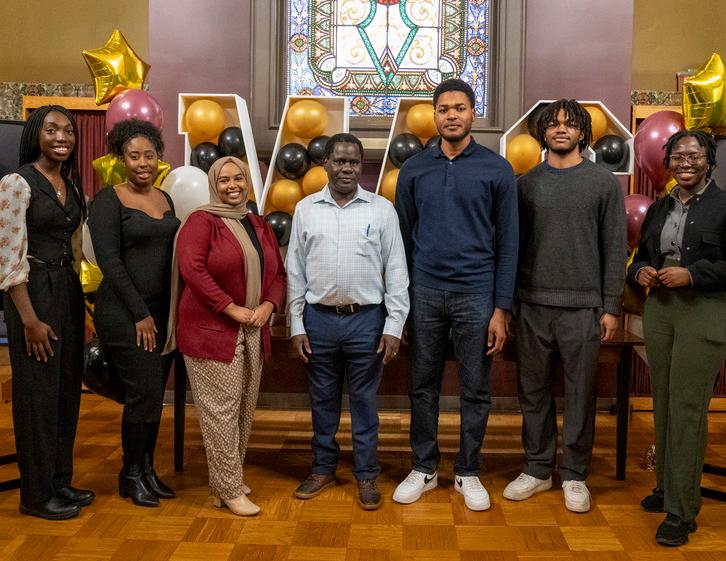

In September 2024, Pryla Pamphile, a native of Dominica, joined McMaster University’s Bachelor of Technology – Biotechnology program as the latest recipient of the Nicholas and Janice Brathwaite Award.
Established by the PETNA Foundation in 2012, this award supports outstanding Caribbean scholars in pursuing undergraduate studies at McMaster.
Inspired by a childhood tragedy where a friend passed away from an untreated heart condition, Pamphile dreams of revolutionizing organ transplants, creating organs tailored to patients to eliminate rejection risks. Outside her academic pursuits, she has demonstrated a passion for community service, founding a Big Sister Program to mentor younger students, empowering girls through the Girl Power Club and supporting underprivileged peers with meals.
“This award is a monumental opportunity,” Pamphile says. “It allows me to achieve my career goals while impacting my community and the world.”

Accessibility in education is essential, and over the past two years, Rashid Abu has collaborated with Silvie Tanu Halim to implement innovative adaptations aimed at supporting students with hearing challenges.
With funding from the McPherson Institute, AbuGhazalah leveraged the lightboard — an invention by W Booth School professor Mike Justason — to enhance livesynchronous virtual learning experiences. By incorporating the lightboard into teaching environments, he developed methods that have significantly improved engagement. The results have been particularly promising, showing increased participation among students who speak English as a second language.

Adjunct Assistant Professor, Andrea Hemmerich, has been a champion for equity, diversity, inclusion, and accessibility in engineering. Over the past year, Hemmerich has contributed through research, workshops, and conferences that aim to foster inclusivity in engineering education. Highlights include co-designing an inclusive innovation workshop in collaboration with students and recent program graduates, which was later delivered at the Canadian Engineering Education Association (CEEA) conferences. She also delivered workshops on equity-based design education at CEEA and presented research papers such as Fostering Inclusive Learning in Engineering Through Equity-Based Design Education. Additionally, Hemmerich shared insights at panel discussions, including McMaster’s “EDIA in Teaching, Learning & Research” panel and the “Innovations in Education” conference. Her work continues to inspire equitable teaching, learning, and research practices.
Janice Taylor Team Lead, Academics
Jim Morrison
Assistant Academic Manager
Ahmed Fakhr
Assistant Professor, Automation Systems Engineering Technology
Marjan Alavi Program Lead, Master of Engineering in Systems and Technology
Jeff Fortuna Program Chair, Power and Energy Engineering



Jim Cotton
The Class of 1962 Mechanical Engineering Chair in Eco-Entrepreneurship
Seshasai Srinivasan
The Walter G. Booth Endowed Chair in Engineering Entrepreneurship and Innovation

Gail Krantzberg’s tenure as Program Lead for the Master of Engineering and Public Policy (MEPP) program since 2005 has been transformative. Under her leadership, over 300 MEPP graduates and 10 PhD students have emerged as changemakers, contributing to a better world through impactful work. Krantzberg’s extensive career spans academia, environmental policy and research, making her a trailblazer in fields such as Great Lakes conservation and climate adaptation.
“Gail Krantzberg’s passion for research and her commitment to students have left an indelible mark on the Booth School. She has inspired us on a daily basis with her unique and elevated capacity to blend expert knowledge with practical experience. We’re excited – and more than a little relieved – to know that she will continue her important research agenda,” says current Program Lead for MEPP, Greig Mordue.
Krantzberg’s legacy of inspiring leadership, mentorship and innovation will continue to shape W Booth School and beyond.

Chi Tang joined W Booth School’s Bachelor of Technology program in July 2010 and served as Program Chair for Power and Energy Engineering Technology since July 2016. During his tenure, he played a pivotal role in renaming the program to Power and Energy Engineering Technology and gained widespread recognition for its relevance within Ontario’s power industry. He also expanded the Program Advisory Committee to include key industry representatives and significantly modernized the curriculum to better serve the evolving needs of the energy sector. Chi plans to remain active in the power industry part-time, offering graduate courses and co-supervising masters and PhD students.
Kostas Apostolou, Undergraduate Associate Director, sums up Chi’s legacy:
“Chi is an exceptional colleague whose leadership will be missed by all. He is the Tai-Chi master, being able to swiftly manage the Power & Energy Program while staying always calm and keeping everyone safe and secure around him. He cares a lot about his students and that is evident by the strong lasting connections he builds with them and the effort he puts into showcasing the real energy world and equipment to them through plant visits. He has been instrumental in the modernization of our Power & Energy Program to meet the current and future needs of North America’s energy grid. I hope he will maintain his ties to SEPT while enjoying extra free time during his retirement.”

“Mostafa Soliman has been a true innovator in the Automation Systems Engineering Technology program. His contributions include creating numerous hands-on experiments and projects that brought core courses like Control Theory and Industrial Automation to life, and his extensive industry experience is evident in every aspect of his teaching, enriching the learning experience for all students. While we will miss his full-time presence, we are thrilled that Mostafa will continue his work on the digital twinning project with the Learning Factory as an adjunct faculty member of SEPT.” – Tom Wanyama

“Melissa’s exceptional work ethic and valuable contributions have earned her a well-deserved promotion to Academic Department Manager of Chemical Engineering. She played a key role in hiring casual employees, managing tenure and promotion documentation and was instrumental in helping me lead the outstanding staff at W Booth School. I have no doubt she will continue to excel as a leader in her new role. While I will certainly miss her presence, our established systems and the rhythm we’ve built, I wish her all the best as she embarks on this exciting new chapter of her career.” – Michele Vaz

McMaster University’s Walter G. Booth School of Engineering Practice and Technology offers the Canadian and global academic community the most modern, integrated and relevant programs and applied research. The school provides a blend of advanced thinking, harmonized with effective application in industry, commerce, and community. It serves as a high-appeal, creative, and dynamic hub within a globally ranked research institution.
Graduates of the school benefit from high-value employment opportunities, the prestige of the McMaster brand and a thoroughly engaging and rewarding educational experience that only practice-based education can provide. Over the years, the school has introduced outstanding programs at both the graduate and undergraduate levels and continues to respond to the rapidly changing demands of an increasingly complex global industrial and technological context. The school is ommitted to the innovative integration of these progressive values into the ongoing refinement and improvement of its programs.
26 Full-Time Faculty
Graduate Programs
MEPP Engineering & Public Policy
MEng Engineering Design
MEng Manufacturing Engineering
MEng Systems & Technology
MEEI Engineering Entrepreneurship & Innovation
McMaster Mohwak Combined Degree/Diploma Programs
Undergraduate Programs
BTech Automotive & Vehicle Engineering Technology
BTech Automation Engineering Systems Technology
BTech Biotechnology
Degree Completion Programs
BTech Civil Engineering Infrastructure Technology
BTech Power & Energy Engineering Technology
BTech Manufacturing Engineering Technology
117 Sessional Faculty
18 Full-Time Staff
483 Graduate Students
2257 Undergraduate Students
Undergraduate FTE Enrolment by BTech Stream - 4 Year
Undergraduate FTE Enrolment by BTech Stream - DCP
